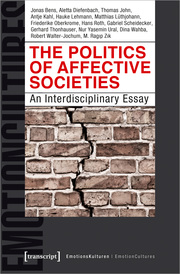Detailansicht
The Politics of Affective Societies
An Interdisciplinary Essay, EmotionsKulturen / EmotionCultures 7
Bens, Jonas/Diefenbach, Aletta/John, Thomas et al
ISBN/EAN: 9783837647624
Umbreit-Nr.: 6063714
Sprache:
Englisch
Umfang: 128 S.
Format in cm:
Einband:
kartoniertes Buch
Erschienen am 15.09.2019
Auflage: 1/2019
- Zusatztext
- Many claim that political deliberation has become exceedingly affective, and hence, destabilizing. The authors of this book revisit that assumption. While recognizing that significant changes are occurring, these authors also point out the limitations of turning to contemporary democratic theory to understand and unpack these shifts. They propose, instead, to reframe this debate by deploying the analytic framework of affective societies, which highlights how affect and emotion are present in all aspects of the social. What changes over time and place are the modes and calibrations of affective and emotional registers. With this line of thinking, the authors are able to gesture towards a new outline of the political.
- Autorenportrait
- Jonas Bens (Dr. phil, Dipl.-Jur.) is research fellow at the Insitute of Social and Cultural Anthropology at Freie Universität Berlin. Aletta Diefenbach (M.A.) is a sociologist and works as a research fellow at the Collaborative Research Centre 'Affective Societies' (DFG-SFB 1171) at Freie Universität Berlin. She works on religion as a public force in the United States and in Germany. Thomas John (M.A.) is an anthropologist and works as a research fellow at the Collaborative Research Centre 'Affective Societies' (DFG-SFB 1171) at Freie Universität Berlin. His research focuses and media ethnography and visual anthropology. In his dissertation project he is concerned with a local art scene of independent documentary filmmakers in Mexico. Antje Kahl (Dr. phil.) is a sociologist and works as a research fellow at the Collaborative Research Centre 'Affective Societies' (DFG-SFB 1171) at Freie Universität Berlin. She is currently heading the method lab at the CRC 'Affective Societies' at Freie Universität Berlin. Her research interests include methods and methodologies, sociology of knowledge, science research, medical sociology, sociology of the body, death and dying. Hauke Lehmann (Dr. phil.) is a film scholar and works as a research fellow at the Collaborative Research Centre 'Affective Societies' (DFG-SFB 1171) at Freie Universität Berlin. His doctoral thesis as a film scholar is concerned with the poetics of affect of New Hollywood cinema. His research focuses on theories of cinematic affectivity and cinematic temporality. Matthias Lüthjohann (M.A.) works as an assistant researcher at the Collaborative Research Centre 'Affective Societies' (DFG-SFB 1171) at Freie Universität Berlin. As a PhD student in German literary studies he is especially interested in the history of transcultural literature, the cultural sociology of critique and monolingualism's affective presence in late modernity. Friederike Oberkrome (M.A.) is a theatre scholar and works as a research fellow at the Collaborative Research Centre 'Affective Societies' (DFG-SFB 1171) at Freie Universität Berlin. She is writing her doctoral thesis on the return of the messenger report in contemporary theatre, namely as a documentary form of representation in the context of flight and migration. Her research interests focus on theatre and spatiality, interrelations between theatre (studies) and art (history) and documentary aesthetics. Hans Roth (M.A.) is a theatre scholar and works as a research fellow at the Collaborative Research Centre 'Affective Societies' (DFG-SFB 1171) at Freie Universität Berlin. His PhD project focuses on the political ambiguities of ridicule and solidarity in ethnic humor and postmigrant theatre. Other research interests include the affective economies of theatre and media, the theatricality of society and the theatre of Bertolt Brecht and its controversial legacy. Gabriel Scheidecker (Dr. phil.) is an anthropologist and works as a research fellow at the Collaborative Research Centre 'Affective Societies' (DFG-SFB 1171) at Freie Universität Berlin. As social and cultural anthropologist his research focusses on emotion socialization in Madagascar and within the transcultural context of Vietnamese Berlin. Gerhard Thonhauser (Dr. phil.) is a philosopher and currently Erwin Schrödinger Fellow of the Austrian Science Fund and associated with the CRC 1171 Affective Societies at Freie Universität Berlin. He holds a PhD in philosophy and M.A.s in philosophy and political science from the University of Vienna. His research focuses on social and political philosophy and theories of emotion from a phenomenological perspective. Nur Yasemin Ural (Dr. phil.) is a sociologist and works as a research fellow at the Collaborative Research Centre 'Affective Societies' (DFG-SFB 1171) at Freie Universität Berlin. She studied in Turkey, Germany, France and Canada. She obtained her PhD in Sociology at EHESS Paris. Her thesis focused on Muslim minorities and poli
